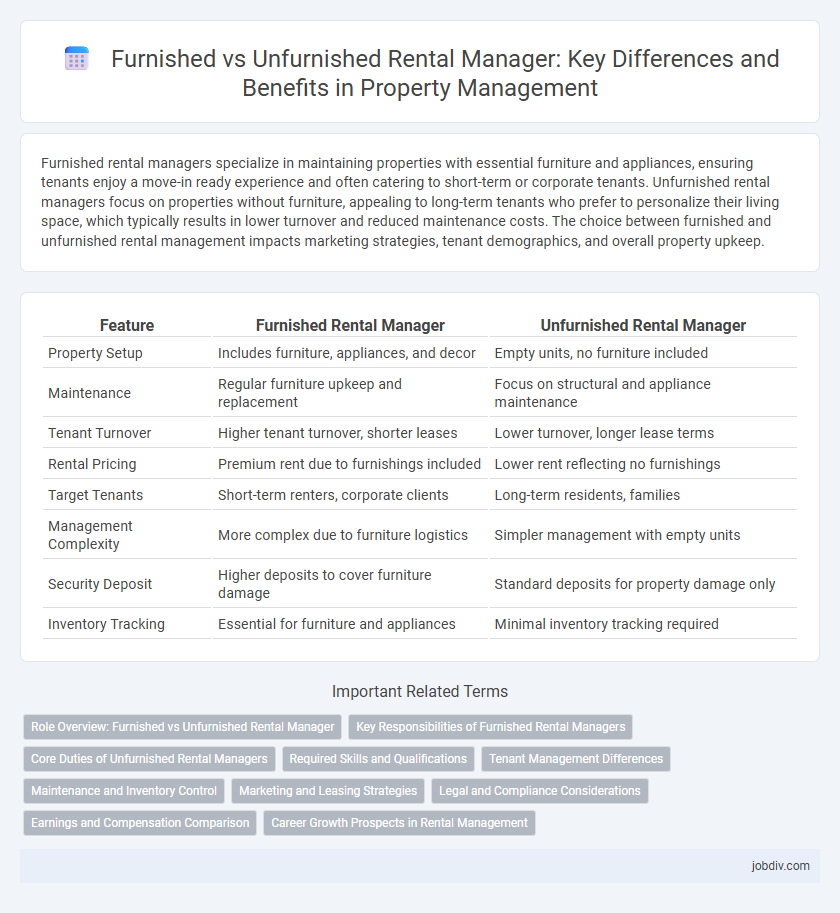Furnished rental managers specialize in maintaining properties with essential furniture and appliances, ensuring tenants enjoy a move-in ready experience and often catering to short-term or corporate tenants. Unfurnished rental managers focus on properties without furniture, appealing to long-term tenants who prefer to personalize their living space, which typically results in lower turnover and reduced maintenance costs. The choice between furnished and unfurnished rental management impacts marketing strategies, tenant demographics, and overall property upkeep.
Table of Comparison
| Feature | Furnished Rental Manager | Unfurnished Rental Manager |
|---|---|---|
| Property Setup | Includes furniture, appliances, and decor | Empty units, no furniture included |
| Maintenance | Regular furniture upkeep and replacement | Focus on structural and appliance maintenance |
| Tenant Turnover | Higher tenant turnover, shorter leases | Lower turnover, longer lease terms |
| Rental Pricing | Premium rent due to furnishings included | Lower rent reflecting no furnishings |
| Target Tenants | Short-term renters, corporate clients | Long-term residents, families |
| Management Complexity | More complex due to furniture logistics | Simpler management with empty units |
| Security Deposit | Higher deposits to cover furniture damage | Standard deposits for property damage only |
| Inventory Tracking | Essential for furniture and appliances | Minimal inventory tracking required |
Role Overview: Furnished vs Unfurnished Rental Manager
Furnished Rental Managers oversee fully equipped properties, ensuring seamless guest experiences through regular maintenance, inventory management, and personalized services tailored to short-term stays. Unfurnished Rental Managers focus on long-term lease agreements, handling tenant screening, property upkeep, and lease compliance without the complexities of furnishing upkeep. Both roles require strong communication skills but differ significantly in operational priorities and guest or tenant interaction dynamics.
Key Responsibilities of Furnished Rental Managers
Furnished rental managers specialize in maintaining fully equipped properties, ensuring all appliances and furniture are well-kept and functional to enhance tenant comfort and satisfaction. Their responsibilities include coordinating regular inspections, managing inventory of furnishings, and arranging timely repairs or replacements to uphold property standards. They also handle short-term lease agreements and dynamic pricing strategies tailored to furnished rentals, optimizing occupancy and rental income.
Core Duties of Unfurnished Rental Managers
Unfurnished rental managers focus on tenant selection, lease agreements, rent collection, and property maintenance while ensuring long-term occupancy. They coordinate repairs and inspections to maintain the property's condition without providing furniture or appliances. This role emphasizes managing empty units efficiently to optimize rental income and tenant satisfaction.
Required Skills and Qualifications
Furnished rental managers require strong skills in inventory management, customer service, and knowledge of short-term lease regulations to handle frequent tenant turnover efficiently. Unfurnished rental managers focus more on property maintenance, long-term tenant relations, and compliance with standard leasing laws, emphasizing negotiation and conflict resolution abilities. Both roles demand proficiency in financial management, marketing, and local real estate regulations to maximize rental profitability.
Tenant Management Differences
Furnished rental managers handle tenant management by providing amenities, coordinating maintenance for included furniture, and often managing shorter lease terms tailored to transient tenants. Unfurnished rental managers focus on longer-term lease agreements, tenant customization requests, and property upkeep without the responsibility of maintaining furniture. Tenant screening in furnished rentals often emphasizes short-term reliability, while unfurnished rentals prioritize long-term financial stability and tenant commitment.
Maintenance and Inventory Control
Furnished Rental Managers prioritize detailed inventory control, ensuring all furniture and appliances are maintained and accounted for to prevent loss or damage. They also coordinate regular maintenance to keep furnishings in optimal condition, reducing wear and tear costs. Unfurnished Rental Managers focus primarily on structural maintenance and general property upkeep, with less emphasis on inventory tracking, as the units typically lack personal belongings or movable assets.
Marketing and Leasing Strategies
Furnished rental managers employ targeted marketing strategies emphasizing convenience, flexibility, and premium amenities to attract short-term renters and corporate clients, often utilizing digital platforms and virtual tours to showcase fully equipped living spaces. Unfurnished rental managers focus on longer-term lease marketing, highlighting customization potential and competitive pricing to appeal to a broader tenant base, leveraging local advertising and strategic partnerships with relocation services. Both rental types optimize leasing strategies by tailoring tenant screening processes and lease terms to align with the specific demands and turnover rates characteristic of furnished versus unfurnished properties.
Legal and Compliance Considerations
Furnished Rental Managers must adhere to stricter legal and compliance regulations, including safety standards for furniture and appliances, inventory documentation, and shorter lease terms governed by specific laws. Unfurnished Rental Managers primarily focus on building codes, habitability standards, and longer-term lease agreements with fewer mandatory safety inspections related to movable assets. Both require compliance with local landlord-tenant laws, but furnished rentals demand more detailed contracts to manage liability and tenant responsibilities for the provided furnishings.
Earnings and Compensation Comparison
Furnished rental managers typically earn higher fees due to increased turnover rates and added responsibilities such as furnishing maintenance and frequent tenant screening, often charging 10-15% of monthly rent compared to 7-10% for unfurnished properties. Compensation for furnished rental managers can include premium charges for cleaning, furnishing depreciation, and lease management, reflecting increased operational costs. Unfurnished rental managers generally experience more stable but lower earnings as long-term leases reduce turnover and maintenance complexity.
Career Growth Prospects in Rental Management
Furnished rental managers often experience rapid career growth due to higher turnover rates and the need for personalized customer service, driving expertise in tenant relations and property maintenance. Unfurnished rental managers build long-term client relationships through extended leases, fostering stability but potentially slower progression in dynamic market skills. Both paths offer valuable experience, but furnished rental management may present more diverse opportunities for advancement in property portfolio management and hospitality integration.
Furnished Rental Manager vs Unfurnished Rental Manager Infographic

 jobdiv.com
jobdiv.com